Today we travel to a future without pets. What would it take for us to give up our fuzzy, slithery, fishy friends? Should our pets get more rights? And if we didn’t have dogs or cats, would we domesticate something else to take their place?
This week’s episode name is perhaps the worst pun I’ve ever committed. Sorry not sorry.
Anyway. In this episode pets are outlawed, gone, we don’t have them anymore. No more dogs, cats, fish, birds, bunnies, none of them. This might seem like a really outlandish future, who actually wants us to stop having pets? Well, it turns out, this actually something that some people currently do advocate for.
To find out more about folks who argue that we should try to phase out pets, I talked to Doris Lin. She’s an animal rights attorney and used to write the animal rights section for About.com. And she explains in the episode that she really does think that we should phase out pets.
But she also wants to clarify something: she’s not about to show up at your door and confiscate your animals. She doesn’t want to separate anybody’s beloved pets from their good homes. (She herself has pet rabbits.) But she does believe that people should stop breeding animals to be kept as pets, and that eventually, after all the rescue animals get home and live their happy lives, we should try to live without them.
There are a couple of arguments for eliminating pets from our lives. Lin says that animals we keep aren’t able to live out their “natural instincts” and that it’s not fair for us to force them to live by “human rules.” Some people point to the increasing body of research that shows that animals might be a lot more intelligent than we once thought.
Today, studies show that dogs can actually understand pointing. So if we point at something, the dog knows that we’re trying to get them to pay attention to that thing. Cats might be able to do the same thing, but they’re harder to study because they don’t care about your stupid experiment. This pointing thing might seem like not that big of a deal. But chimpanzees, our closest living relative, can’t do that. Which might seem surprising, but as David Grimm points out in the episode, we’ve evolved with dogs for something like 30,000 years, and with cats for 10,000 years.
Grimm is the Online News Editor of the magazine Science, and the author of a book called Citizen Canine: Our Evolving Relationship with Cats and Dogs. And in his book, David talks about how the way we think about our animals has totally changed in the last century. They used to be considered lower than objects, less important than your table or toaster. But today, most people consider their pets far more important than their tables. There have been custody battled fought over pets, dogs have been appointed lawyers, and some animals have even inherited money.
A 2015 Harris Poll showed that 95 percent of pet owners consider their pets members of their family. During Hurricane Katrina, some people decided to stay behind with their pets when they were told the rescue boats would only take human passengers. Some of those people died.
So the idea of a world without these creatures in them is really hard to imagine, even for Lin who advocates for this future. But that never really stops us here on this show! And in the second half of the episode we talk about all the ways that this might happen. Listen to find out!
This episode also includes two voicememos from people responding to our quantified self show from last week. Both of them are really interesting, so listen to the end to hear them.
Flash Forward is produced by me, Rose Eveleth, and is part of the Boing Boing podcast family. The intro music is by Asura and the outtro music is by Broke for Free. The episode art is by Matt Lubchansky.
If you want to suggest a future we should take on, send us a note on Twitter, Facebook or by email at info@flashforwardpod.com. We love hearing your ideas! And if you think you’ve spotted one of the little references I’ve hidden in the episode, email us there too. If you’re right, I’ll send you something cool.
And if you want to support the show, there are a few ways you can do that too! We have a Patreon page, where you can donate to the show. But if that’s not in the cards for you, you can head to iTunes and leave us a nice review or just tell your friends about us. Those things really do help.
I’ll close this post with a gratuitous photo of my dog, who I will not be giving up thank you very much.
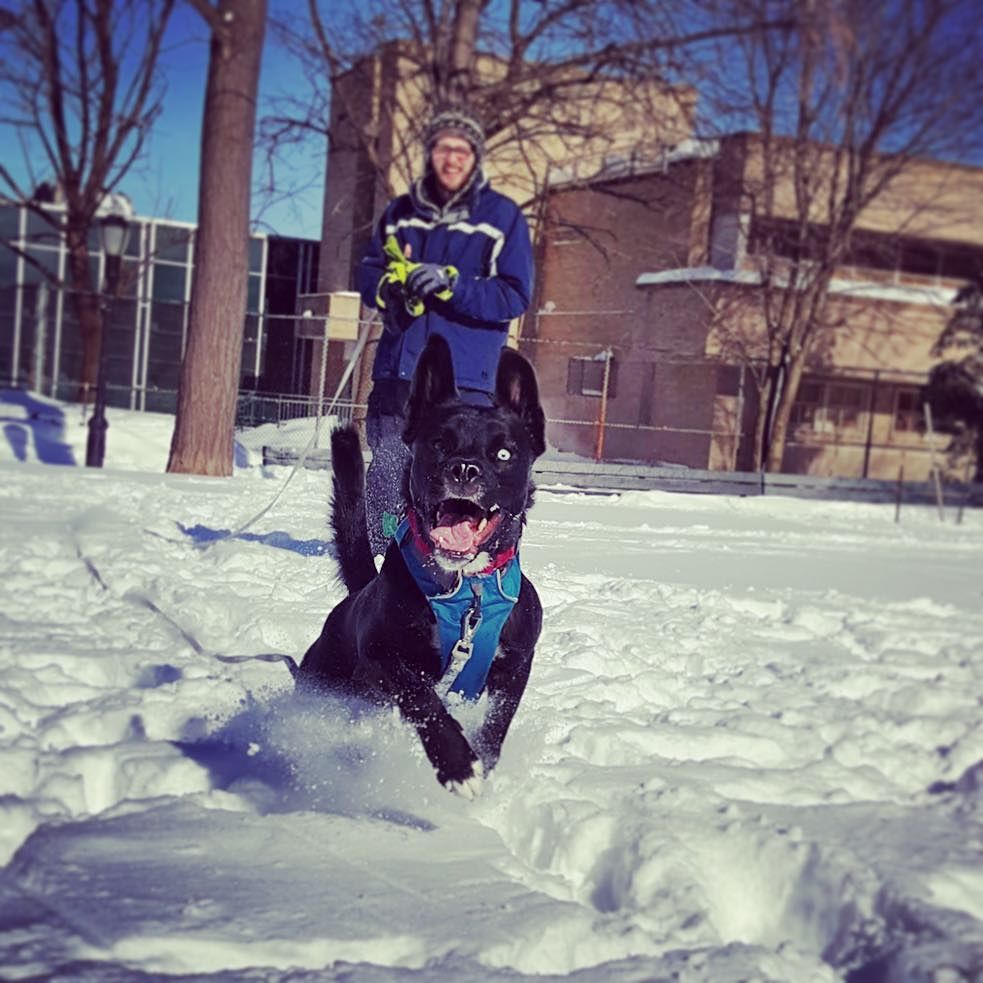
▹▹▹▹▹▹▹▹▹▹▹▹▹▹▹▹▹▹▹▹▹▹▹▹▹▹▹▹▹▹▹▹▹▹▹▹▹▹▹▹▹▹▹▹▹▹▹▹▹▹▹▹▹▹▹▹▹▹▹▹▹▹▹▹▹▹
TRANSCRIPT
[Ringing]
Hello, and welcome to the United States Animal Welfare Task Force Hotline. All calls are toll free and strictly confidential. To hear about the new rules and regulations surrounding domesticated animals, press one. To report an animal welfare violation, press two.
[TWO]
To file a report about [birds] press one.
To file a report about [cats] press two.
To file a report about [dogs] press three.
[THREE]
Please select the type of report you would like to file.
If someone is breeding dogs press one.
If someone is selling dogs press two.
If someone is distributing material about how to breed or sell dogs, press three.
If someone is keeping one or more dogs as pets press four.
[FOUR]
Please leave a message with as much detail as possible about the violation you would like to report. Remember, keeping pets of any kind of against the Emergency Animal Welfare Act. All calls are strictly confidential. Remember, if you see something, say something. Please leave your message after the tone.
[tone]
Silence, barking dogs
Hangup
Okay so in this future pets are outlawed. We are not allowed to keep dogs, cats, fish, birds, bunnies, none of it. This might seem like a really outlandish idea, who really wants us to stop having pets? Well, it turns out, this actually something that some people currently do advocate for.
Doris Lin: Animal advocates believe that animals should be allowed to act out their natural instincts, and that doesn’t mean living in a house, living in a cage, living in a pen, and having to follow human rules. You know, get off the couch, get off the table, and don’t eat that eat this.
That’s Doris Lin,
Doris: And I’m the assistant director of legal affairs for the Animal Protection League of New Jersey.
Rose: Doris’s job is to defend animals, and the people who are trying to help them.
Doris: I just had a case last week where a woman had rescued two baby squirrels and she couldn’t find an wildlife rehabber to take the squirrels, so she took care of them herself, and the next thing she knew the division of fish and wildlife confiscated the squirrels and sent her a citation for possession of a game animal without a permit. So there was a lot of publicity surrounding the squirrel case and I defended her and we got the charge dismissed.
Rose: What happened to the squirrels?
Doris: We’re trying to find out.
Rose: Right now, pets are considered property in the eyes of the law.
Doris: Yeah your pet dog or your pet cat, even though you consider that dog or cat to be a member of the family, the law views that dog or cat just like a table or a lamp.
Rose: What this means is that if your neighbor comes over and kills your dog, it’s not like it’s come over and killed a member of your family. It’s more like your neighbor has come over and broken some prize antique.
Doris: So if your neighbor killed our dog you’d be able to sue the neighbor for the fair market value of your dog which is probably nothing, even if your dog is a champion purebred, the dog might be only worth a couple thousand bucks.
Rose: Now there is one added layer on top of this which animal cruelty laws. So your evil neighbor who has come over and killed your dog will probably face something more than just a property damage fine.
Doris: So your neighbor would be facing hopefully some criminal charges.
Rose: But beyond that, because pets are considered property, there can be some strange legal situations.
Doris: People have gotten into custody disputes, like in divorces, over a dog, and for the most part courts will not recognize any kind of visitation rights or visitation arrangements that you might try to set up with your dog in the case of a divorce. Because you wouldn’t set up visitation with a table or a piano or anything else like that.
Rose: And this is all really new. Not that long ago animals weren’t even considered property. They were lower than that, less valuable than your toaster.
David Grimm: Someone could steal your pet or kill your pet and nothing would happen to them
Rose: That’s David Grimm, he’s the Online News Editor of the magazine Science, and the author of a book called Citizen Canine: Our Evolving Relationship with Cats and Dogs. And in his book, David talks about how the way we think about our animals has totally changed in the last century.
David: We’ve had custody cases where people have fought over the custody of their cats and dogs during a divorce proceedings. Cats and dogs can inherit money now in the last decade or so, and as I write in the book there have been a few recent court cases where dogs have been given their own lawyers. Economically, socially emotionally culturally, the relationship we have with these animals, they’ve become almost like citizens in our society, they’ve become so important in our homes.
Rose: One of the reasons for this change, is that we’re slowly learning more and more about the inner lives of our pets.
David: Yeah it’s the case before where a lot of animals were a black box to us and we just assumed “well they’re probably just not that smart, they’re just animals.” And what we find is as we study all these animals we discover all these surprising things that we just really didn’t anticipate.
Rose: Today, studies show that dogs can actually understand pointing. So if we point at something, the dog knows that we’re trying to get them to pay attention to that thing. Cats might be able to do the same thing, but, they’re harder to study because they don’t care about your stupid experiment.
Now the pointing thing might seem like not that big of a deal. But chimpanzees, our closest living relative, can’t do that. Which might seem surprising, but, remember, dogs and cats have evolved with humans for a long time.
David: In fact dogs were the very first thing we ever domesticated, and we don’t know exactly when it happened but it was probably 20 to 30 thousand plus years ago. So dogs have been with us for a really long time, so long infact that there’s some idea that we coevolved with dogs a little bit, that we acquired some traits and they acquired some traits just from the two of us cohabitating for so long together. And cats it’s been about 10,000 years which is still a really long time.
Rose: The more researchers investigate the intelligence of dogs, cats, birds, rabbits, and the like, the more they realize that they’ve got a lot going on. Which sort of complicates one of the arguments about animals and the ethical quandaries they entail. There’s been a lot said about orcas and dolphins, and whether it’s ethical to keep them in a place like Seaworld. And we worry about that because we know that they’re smart animals. But if we’re making decisions about which pets we should keep and which we shouldn’t just based on how smart they are, where do we draw the line? Are fish dumb enough to be pets? What about spiders or snakes? Science can’t really answer that question.
David: Scientists don’t like to compare one animal’s intelligence to another, so you can’t validly scientifically say you know cats are smarter than dogs or dogs are smarter than cats or dogs are smarter than chimpanzees, but what we can say is that within a species we can sort of figure out what an animal’s talents are.
Rose: And Doris says that intelligence isn’t the thing she worries about with animals. It’s suffering.
Doris: I think actually the lizards and spider and fish suffer more because they’re so much more difficult to take care of. I mean a mammal lives in your house and they’re comfortable in your house, but a lizard or spider or fish lives in a little tank, a little bowl and they’re so fragile, you know they’re cold blooded, and it’s much harder to keep them alive for what would normally be their natural lifespan. I mean people consider goldfish disposable. Your goldfish dies, you go out and buy another one, who cares if they normally live 10 or 15 years.
Rose: Now, Doris believes that animals should be, as she said, allowed to act out their natural instincts, whatever that means. But she also wants to be very clear about something: she’s not about to show up at your door and confiscate your animals.
Doris: I think it’s important for people to understand that animal rights activists do not want to take your cats and dogs away. We’re not trying to separate fluffy and fido from your good home.
Rose: I mean, she herself has pets.
Doris: I do, we have two rescued rabbits and two rescued guinea pigs, and I’m also fostering a rabbit right now. Our two rabbits are a bonded pair, so they’re very into eachother. And you know rabbits have different personalities just like people do, some are more friendly and some keep to themselves. We have one rabbit who’s friendly who loves to be pet and the other one just wants nothing to do with us
Rose: So she’s not leading some kind of anti-pet brigade, armed with cages and treats to lure your animals away from you and take them to some terrible place. She’s not a Disney villain.
Instead, she’s hoping that slowly but surely, people stop breeding new pets. So the total pool of pets stops growing. The only pets that do still exist are ones in shelters or who have been rescued, and then eventually, all of those will be adopted, live their full, happy lives, and die. The ultimate end point here is still a world without pets.
Doris: Absolutely, I think we should be moving in that direction. I know it’s going to be hard for society to give up the idea of having pets.
Rose: Which, even to Doris, is pretty hard to imagine
Doris: But I think that’s so far into the future, I don’t think anybody is seriously proposing a bill against breeding dogs or cats.
Rose: So how would we get there? Is it totally impossible? In a bit, we’re going to talk about all the ways that this might, or might not happen. But first, a quick word from our sponsors.
[[Flash Forward is supported in part by listeners like you! If you like the show, you can donate to keep us going over at Patreon. Patreon is a little bit like Kickstarter, but instead of donating one time you donate a little bit of money for every episode. You can set a monthly limit, so you don’t break your own bank, and Patrons get some cool rewards like transcripts of the show, a fun newsletter that I put out every week, and your voice in the future! So, if you want to donate, head to Patreon.com/roseveleth spelled roseveleth and do that! Okay, back to the future!!]]
Rose: So this week we’ve been talking about pets, and a future in which we no longer have them. Which, even for folks like Doris who actually advocates for the end of pets, is a really hard future to imagine. But that is the point of this show! So let’s try. Here are couple of ways this might happen.
There’s the gradual approach that we talked about earlier. We ban the breeding of new pets, and eventually after all the currently existing pets die, there aren’t any more.
But humans seem to have a pretty strong knack for domesticating animals. In fact, we might have domesticated cats twice in our history. So it’s possible, after slowly phasing out all the pets, we just… domesticate some new ones.
Doris: Certainly in the future there would be robotic pets, and we also have something like that now, with these little robots that act as pets and a lot of people have virtual pets on their smart phones or tablets. But of course that doesn’t take the place of something furry and warm who sits in your lap. I don’t know maybe the domestication process would start all over again with animals who are curious and come up to us in the wild. Who knows, maybe squirrels will be pets in the future.
Rose: But there’s another gradual version of this story that David suggested. It doesn’t really mean the elimination of pets, but it might be a big change in how we think about them. David points to a parallel in zoos.
David: You know we’ve seen this with zoos, where 100 years ago you had a lion in a five by five foot cage, and everybody was perfectly fine with that. And then as we’ve sort of become I think more empathetic as a society and more attuned to the thoughts and feelings of animals, we’ve really rejected that so you’ve seen a lot of zoos really adopt these larger enclosures and you see things like Seaworld, where people are really up in arms about orcas in captivity living these in these relatively small environments and people fighting for these animals to be released from captivity, or chimpanzees in research labs.
Rose: So it’s possible that as we learn more and more about our dogs and cats, and what they need, and how they think, we might realize that the way we’re keeping them is wrong. And that we can only really ethically keep a dog say, if we have a huge plot of land for it to run around on and a pack of other dogs for it to hang out with. Which wouldn’t eliminate pets, but make them much more unusual.
Okay but what if we went the legal route to try and eliminate pets. There are some people today who advocate for a change in the legal status of pets from property to people. Which on its face might sound good, pets would get more protections and be seen in the eyes of the law a bit more like we see them in our eyes.
David: The choices we have now, at least legally, are are either your cat or dog is a toaster or your cat or dog is a person. And I think given those choices most people would say my cat or dog is a person. I certainly treat them much more like a person than like I do a toaster.
Rose: But if you think about that proposal for a bit longer, and all the weird things that might happen if pets became legally, people, it starts to get a little absurd.
David: If your dog was a person and say some guidelines came out that said you should walk your dog three times a day, and you only have time to walk your dog twice a day. Could some animal protection agency come to your house and say you’re an unfit guardian because you’re not walking your dog as much as you should and the dog isn’t getting exercise and that’s bad for your dog and we’re going to take your dog away just like child protective services might take your child away. Or say you took your cat in for a checkup and your vet says your cat has a tumor, it needs chemotherapy, it’s going to be $5,000 and you say well I can’t afford that, just but the cat to sleep. And the vet says well I can’t do that because this cat is now a person and you can’t just put a person to sleep, it violates the cats right. Or could you not spay and neuter your pets anymore because you violated your bodily rights.
Rose: So if the folks who want legal personhood for pets get their way, it might actually become really difficult and expensive to own a pet.
David: It might become too onerous to own them, too expensive or too many regulations in having pets then there would be a big disincentive to getting them.
Rose: And that could drive down the number of pets. But again, it wouldn’t really get rid of them entirely. To really, truly get rid of pets we’d have to get a little more extreme.
What if there was a horrible disease that was spreading across the globe. It was carried by cats and dogs, and infected and killed humans. And the only way to stop it, was to eliminate our cats and dogs.
This sounds really improbable, and it is, BUT there is a historical precedent for something kind of like this. When the plague started going around in the Middle Ages, people blamed cats and dogs for transmitting the disease. Pope Gregory IX actually linked cats to Satan (fun fact, this is the first time the black cats get their bad reputation). People saw dogs and cats are plague-bearers, and they killed a lot of them.
So what if something similar happened? Would we be able to get rid of our pets. David says he doesn’t think so.
David: If there was some virus that was spreading in cats that was really lethal to humans and the government said you have to kill, if you’ve got a cat you’ve got to take them to the vet right now and have them euthanized. I just really feel like I would be the guy that put our cats in our basement and just stowed them away. Because like, for us, even though we have human children, our cats are like our children, I can’t imagine a scenario where I would voluntarily kill my cats, honestly even if I thought it was for the greater good. I just, I think I would have a really hard time with that.
Rose: And there’s some good evidence for that David is not alone. A 2015 Harris Poll showed that 95 percent of pet owners consider their pets members of their family. During Hurricane Katrina, some people decided to stay behind with their pets when they were told the rescue boats would only take human passengers. Some of those people died.
So even if there was some kind of terrible disease being spread by pets, it might not be enough to make us get rid of them.
Okay, but what if a maniacal dictator took over the world and unilaterally banned pets? Enforced by local armies, pets are illegal, and if you’re caught with one you’re arrested. David says his answer is the same.
David: I think in any of those scenarios, and I hate to be the naysayer here, but I think in any of those scenarios, whether it’s a dictator or a virus or whatever, you just substitute cats and dogs for children. A dictator comes to the US and says you have to kill all your children. A virus is spreading around the world that we know children transmit and we know that if we just killed all of our children then the virus would go away. You know, and some people might balk at that comparison, but we know that a vast number of pet owners think about their pets the same way they think about their children. And so I think any scenario where an outside force is basically saying you have to get rid of your pets, you have to kill your pets, a lot of those owners in fact I would bet on a majority of those owners substituting the word cat for child and saying no way in hell.
Rose: What it might take, to really really really get rid of pets, is a different kind of virus. One that kills dogs and cats. Because we just would never do it.
[Music up]
What do you think? Do you have pets? What would it take for you to give up your animals? Or to commit to never owning another one? Tell us! Leave a voicemail at (347) 927-1425 or send us a voice memo to info@flashforwardpod.com. For instructions on how to do that, go to our website, flashforwardpod.com, and you’ll see a link.
Let’s hear what people thought about last week’s episode.
[Andrea]
Thank you Andrea. This is something I should have talked about last week and I didn’t so I’m really glad you mentioned it. Okay, here’s another voice memo we got about tracking that I thought was really interesting.
[Bethany]
I love that, and I think she’s probably right.
Okay, that’s all for this week! Tell us what you think and I might feature you at the end of a show just like this.
Flash Forward is produced by me, Rose Eveleth, and is part of the Boing Boing podcast family. The intro music is by Asura and the outtro music is by Broke for Free. OTHER CREDITS The episode art is by Matt Lubchansky.
If you want to suggest a future we should take on, send us a note on Twitter, Facebook or by email at info@flashforwardpod.com. We love hearing your ideas! And if you think you’ve spotted one of the little references I’ve hidden in the episode, email us there too. If you’re right, I’ll send you something cool.
And if you want to support the show, there are a few ways you can do that too! We have a Patreon page, where you can donate. But if that’s not in the cards for you, you can head to iTunes and leave us a nice review or just tell your friends about us. Those things really do help.
That’s all for this future, come back next week and we’ll travel to a new one.

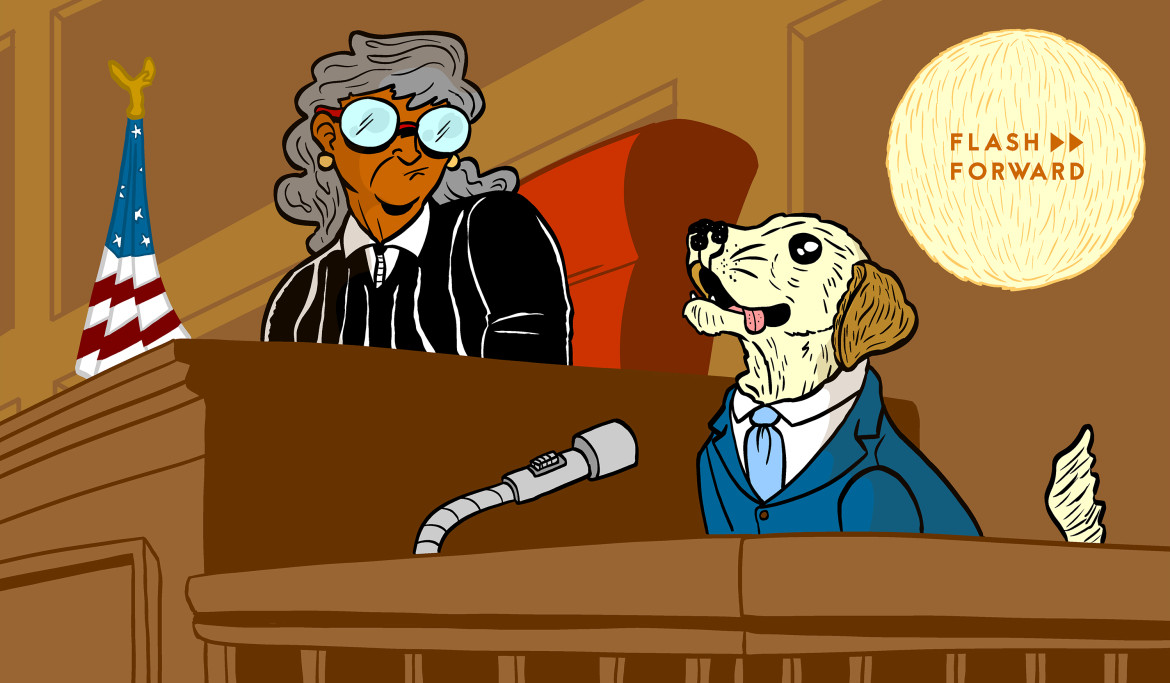
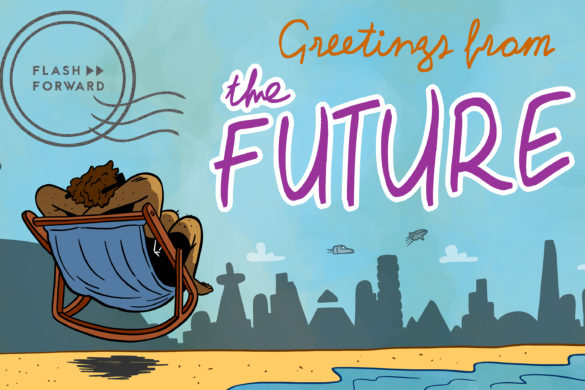
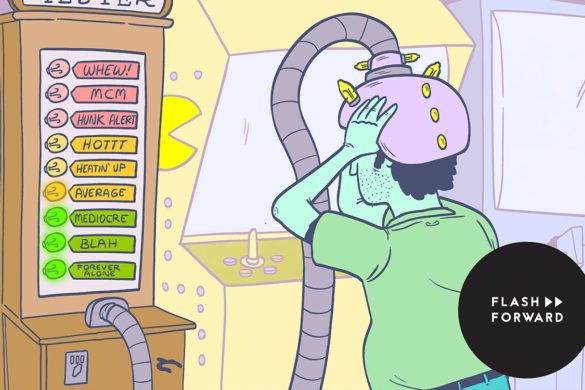
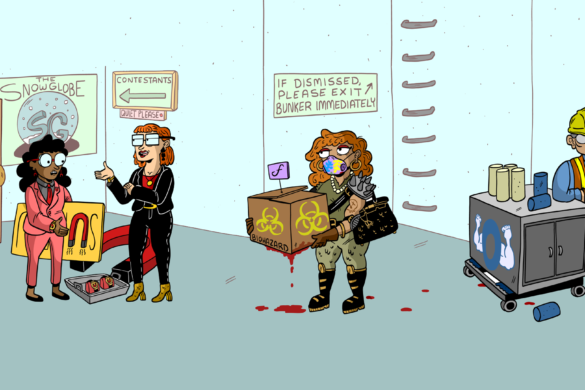
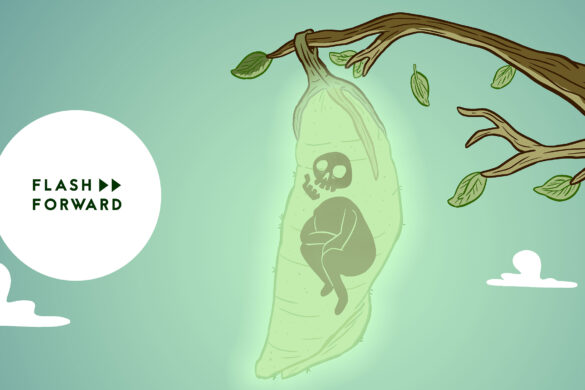
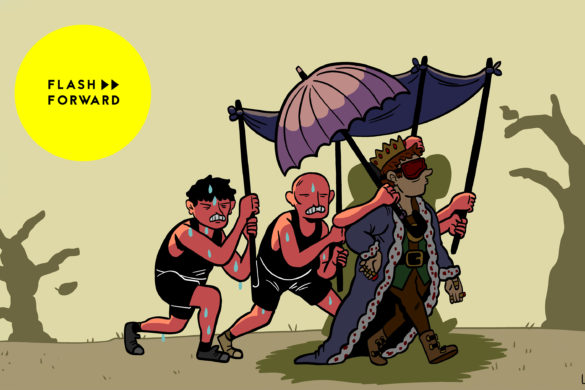
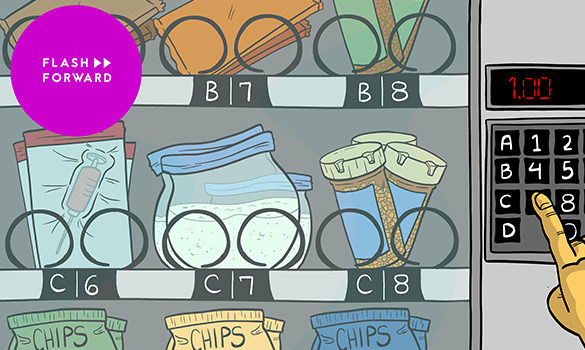
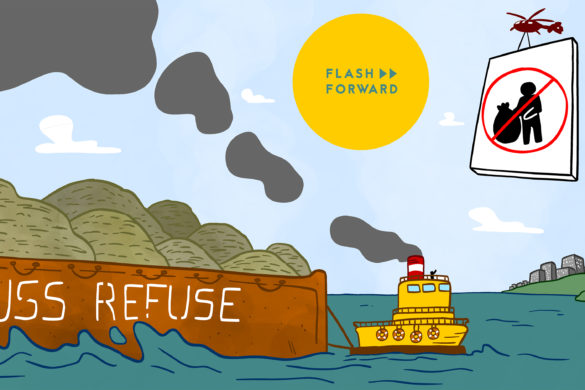
25 comments
I think something important to consider with this future would be the effect of this. If we assume that the immediate removal of pets was successful, how would people react. Pet’s are bought for companionship, and usually have a positive affect on the person/s who take ownership. In fact they are so good at this that therapy pets are becoming increasingly popular. Not only is there a reliance on them for companionship but they are also being trained to provide specific functions such as guide dogs for the blind, and bomb sniffers. Are the police given special privileges to use dogs for work? If so, would this have a positive impact on job applications for these jobs. What would the economic impact become with many businesses becoming irrelevant?
Just some more questions to consider?
I have a pet, through marriage, but I somewhat get the dilemma. Why DO people have pets? “Hey, my life isn’t hard enough. I’m bored! Let’s get something that requires a ton of my attention all the time so that I can feel NEEDED!” Perhaps this assessment is more accurate: “Because I’m a bit emotionally unstable, I need guaranteed companionship and validation that I’m a loveable person.” Let’s face it — Pets are basically just slaves, and their co-dependent masters justify “owning” them by convincing themselves that the animals need them. They are better off with us than they are on their own, right? (By the way, this has been an argument used over and over again to justify taking slaves. Let’s ‘domesticate’ them, right? Would you rather starve or die at 19 in some tribal war or come with me and be relatively safe as a house slave? And everyone knows that this does NOT make slavery okay.) Indeed, Diesel, my English bulldog, would get hit by a truck in less than 5 minutes if I put him out on the street, and I am certainly not advocating shoving animals that currently have warm homes out into the cold. But what people are doing is breeding tons of animals and THEN claiming that all of those animals, which they basically just created themselves, need their help! It’s like starting a fire so that you can keep your job as a fireman…… because you really like to drive the firetruck. People don’t have pets just because they are trying to “save the animals.” People, myself included, have pets for more selfish reasons. Good or bad? Not my call.
I go through every day. I’m no longer young but not ancient. Divorce was hard, living alone is difficult, dealing with the public quirky but I respect individuals as they respect me. I no longer need to change the world, well, I may need to push myself to see modern sensibilities. Would prefer Bernie but Hill is there vs the Nazi elelment. Whatever. My dogs, previously chasing my boy dog Zack to oceans Mexico, jumping into the heavens, non-stop joy for Frisbees unattended, Zack exiting in a relatively short time, 11 years. Now my girl dog Cassie, lazy. sleepy, to simply say, ” you’re my dad, thanks”. She don’t swim, hunt, retrieve, but Cassie is my greatest love. Zack was my boy. I believe we need dogs/pets/in our lives. I will never be comfortable without my right-hand companion and confidant.
[…] ▹▹ Full show notes […]
[…] ▹▹ Full show notes […]
[…] ▹▹ Full show notes […]
[…] ▹▹ Full show notes […]
[…] ▹▹ Full uncover notes […]
[…] Rose Eveleth imagines a future with no pets. […]
[…] ▹▹ Full show notes […]
There is not very much need to speculate on what a life after pets would look like. There are already many “pet free” zones on the planet. Rural people in Africa typically do not have pets – the scraggy dogs you see lying around fend for themselves and if someone does have a dog the dog has a job – hunting, stock guarding, watchdog or whatever. In communist Russia and eastern Europe pets were firmly discouraged, and I doubt that there are many pets in North Korea.
[…] ▹▹ Full show notes […]
I heard about Flash Forward referenced in another radio show on NPR/KQED and it sounded interesting. Sometimes it is, but I have to say listening to this podcast annoys the crap out of me. First it starts out with that horrid, I cannot even call it music, it is more like someone holding kittens and scratching their claws against a chalkboard. That horrible sound is enough by itself to put me off this podcast, but then sometimes it goes into this commercial for glossy-something, that is way too long compared to the shortness of the podcast … and who cares, just tell me who sponsors you, that’s all … another annoying thing … and then there is the voice of the narrator that is another assault on my ears. Sorry, but take some voice lessons or use some relaxation techniques or just grow up past the age of 9 so you sound a little human. There are some interesting ideas in some of these shows, but I don’t know how any media program can be so good at irritating the audience … it is like you just want to drive people away. Good luck, I can’t take it anymore. Sorry, but maybe you want to hear the bitter truth of at least one of your potential audience thinks.
Sorry to see you go Bruce! I can’t help being 9 years old, but if you figure out how to age people faster please let me know I would love to interview you for the show.
Well there are two ways I think you could go about that. One would be that you leave the earth in a small space craft, then accelerate the earth to near the speed of light (without destroying it in the process), and have it buzz around really fast relative to your rather stationary speed, and you will technically age faster than everyone else. Or rather, they will experience the passing of time more slowly than you. Now I know what you’re thinking, accelerating the earth to near the speed of light without destroying it is rather daunting task. Also, if you thought climate change was a problem before I can’t imagine a 12 minute solar cycle will help things very much. Thankfully there is a second option. Put every person from earth onto a big spaceship and then just have that fly around at near the speed of light for some time while you stay on the earth. It will be a logistical nightmare to try to get everyone on one giant spaceship and building such a spaceship would probably use most of our planets resources, but it would in effect age you faster than everyone else, and you’d get the entire planet to yourself for a while, which might be a pretty cool vacation.
[…] ▹▹ Full show notes […]
[…] ▹▹ Full show notes […]
[…] hypothesis. Might there be a future with no pets? Excellent podcast, by Rose Eveleth. Listen of the […]
Will dogs and cats disappear if we stop “adopting” them?
Most dogs and cats in the world are not bred by specific people. They exist near and around humans, living off trash and other “human” food-sources. Any street picture in Mumbai, Beijing, Athens or Tel-Aviv shows these furry residents. Many others are “farm dogs” or “yard cats” that are domesticated but are not really pets. It means that even if we do not keep them at home they will keep showing at our door.
What is the “natural” state of pets?
Reflecting on the episode “microbiome”, you can think about a “macrobiome” consist of humans, dogs, cats and probably pigeons and sparrows as well as some farm animals. These species live in one habitat maintaining many interrelations of food chains and other contribution such as protection from other animals, sanitation and more. Eliminating one of them has similar eco-impact as extinction of any animal in a “natural” habitat. So the “ecological” or “moral” consideration for stop breeding them is not valid
If animals had the same rights as humans the world would be in chaos. There would be a pigeon running for president, (which would still be better than Donald Trump but…) there would be an otter giving you your paycheck. Animals wouldn’t be able to have the same rights as humans. There so used to be domesticated that if we let them on there own they would starve. Not to mention that animal erotica would be legal and well that’s just uncomfortable for everyone. They don’t have the necessary iq and brainpower to live in a harsh capitalist society. If we were back in time than maybe animal equal rights could be possible but now after years and years of captivity it just wouldn’t be favorable for both the human race and animals.
I agree with the fact that orcas and other organisms should not be held in captivity unless they are receiving help, or are severely injured, or even endangered , otherwise they should be set free. However, I do believe we should have pets such as dogs, and other animals that are dependent of us. In addition, I agree that if dogs were considered as people, it would be chaotic due to the fact that there could be dog services, and it would be tough and expensive to nurture for one
I appreciate how this podcast incorporates the future and uses that through out the talk. It makes it easy to be in a daze and almost truelly believe that all of this is going on right now in the real world.
[…] is seen as a violation of their civil rights. These scenarios and others like them are explored in Unpawful, an episode of one of my favourite podcasts of all time, Rose Eveleth’s Flash Forward. Flash […]
[…] Unpawful (pets are outlawed): This future doesn’t seem to be moving forward really, which is good for me because I will die to keep my dog. […]
[…] be like. Some of my all-time favourite episodes (which I’d recommend you start with) include Unpawful (about a future where keeping pets has become illegal), Popnonymous (popstars no longer perform in […]